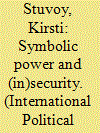|
|
|
Sort Order |
|
|
|
Items / Page
|
|
|
|
|
|
|
| Srl | Item |
| 1 |
ID:
072546


|
|
|
|
|
| Publication |
2006.
|
| Summary/Abstract |
In the debate on human security, the leading question for many is 'where do we go from here?' Through this article, the authors contribute to the discussion by exploring both the extent to which gender approaches have been relevant to the human security debate thus far and how they can offer some directions forward. They argue that gender approaches deliver more credence and substance to a wider security concept, but also enable a theoretical conceptualization more reflective of security concerns that emanate from the 'bottom up'. The authors therefore incorporate gender theory to develop human security as an epistemological perspective to security studies. Gender theory claims that security must be linked to empowerment of the individual, as well as to the capabilities to create positive environments of security. They employ the tool of resistance as one crucial example of human agency in security. Practices of resistance, in the latter's various empirical forms, are present in all social contexts. Such a perspective on security directs attention to the practices of agents and provides a basis for exploring contextually dependent insecurities and securities.
|
|
|
|
|
|
|
|
|
|
|
|
|
|
|
|
| 2 |
ID:
097741


|
|
|
|
|
| Publication |
2010.
|
| Summary/Abstract |
In ongoing discussions surrounding the issue of human security, the security of individuals has become entangled in conceptual debates that are preoccupied with notions of appropriate variables, measurements and issue areas. This article suggests and illustrates a basis for human security research that is distinct from such objectivist empiricism. A case study of crisis centres in northwest Russia is used to demonstrate that human security is not only a matter for objectified generalizations, but also a question of practices. Feminist security theory and the work of Pierre Bourdieu are used to address methodological concerns raised during fieldwork on crisis centres in northwest Russia. Three dimensions are discussed: the conceptualization of security for the specific-actor approach of crisis centres, the ways in which relevant empirical data are established, and the subsequent interpretation of such data. The discussion shows, first, that rethinking security for crisis centres reveals contingencies in the research process that are relevant to the establishment of human security knowledge; second, the practice of human security research reflects the fragility in the understanding and production of security in everyday contexts. Accordingly, when we examine human security, our analysis ought to be directed at security as an ambiguous practice.
|
|
|
|
|
|
|
|
|
|
|
|
|
|
|
|
| 3 |
ID:
101607


|
|
|
|
|
| Publication |
2010.
|
| Summary/Abstract |
The general role of symbolic power in contributing to the legitimacy of security has been acknowledged, and this article seeks, more specifically, to advance the understanding of gendered power dynamics and (in)security. It demonstrates how, through their first decade of existence, nonstate crisis centers in Northwest Russia contributed to security but also to the (unintentional) marginalization of women's security. Their emphasis on victims acting on their own behalf, inducing them to becoming acting subjects, is a misrecognition of the effect of symbolic power in this field. The refusal by the Russian (patriarchal) legislature of anti-domestic violence law, combined with the hesitancy of public institutions' personnel (doctors, police, judges) to provide support for women, gives the local crisis centers, which lacked financial resources, little choice about which intervention strategies to prioritize while emphasizing women's personal responsibility.
|
|
|
|
|
|
|
|
|
|
|
|
|
|
|
|
|
|
|
|
|